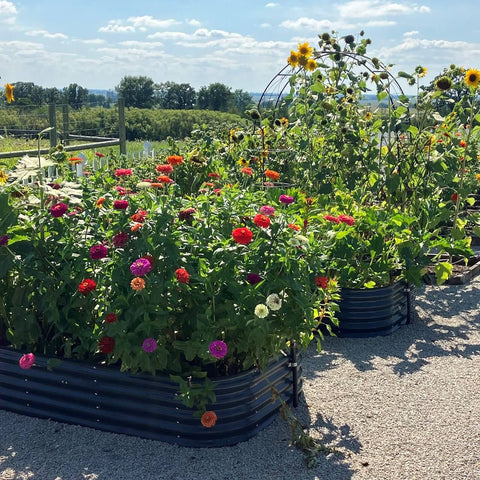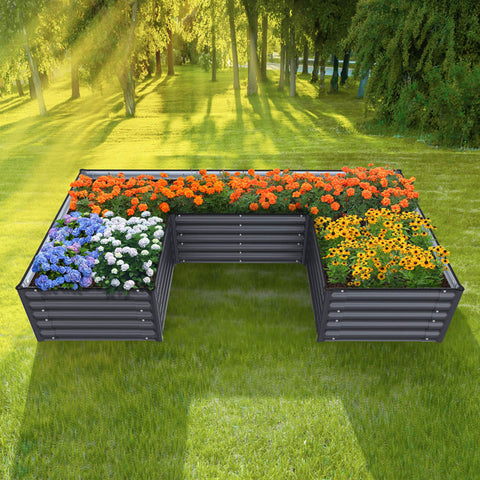How to Protect Your Garden Beds from Four Pests
Creating a beautiful garden is a rewarding experience, but it can be frustrating when pests cause damage despite all your efforts. Pests can be a common issue for raised garden beds and container gardens, leaving many gardeners feeling overwhelmed. However, there are effective natural methods for repelling pests that you may not have explored yet.

How to Keep Gardens Safe
These options may not apply to every garden, but they are an excellent method for targeting all pests rather than a few. If you are dealing with many issues at the same time, please try these options.
- Setting obstacles
Barriers may be a thorn in the eye of a beautiful garden, but they can effectively prevent pests from leaving your beloved plants. Insect nets are a good way to prevent pests from getting away from crops, but you must remember to fix them on the ground so that insects do not enter casually. This mesh has small holes that allow water to enter, but it can prevent any insects attempting to squeeze in. Indeed, setting up barriers is not the only way to ensure the safety of gardens. Planting vegetables in sturdy containers can provide better protection, especially with metal raised garden beds. Learn more details in OlleGarden.
- Grow amidst resistance
There are some varieties of vegetables and fruits that are resistant to insects. Thanks to the Andean tomato - Peruvian native - scientist Martha Mutschler Chu, who is designing tomatoes to grow in a cool climate, their sugar compounds repel the same insects in Peru. Although these tomatoes may not be available temporarily, you can study other varieties of crops for your personal garden - such as potatoes that repel eels.
- Introduce beneficial errors
If you can't handle a garden alone, you can get some help. Planting things that attract beneficial insects, such as ladybugs and lace. They can help control the number of pests and show them that they are not popular in your garden. In addition to your crops, plant flowers and bring these beneficial insects to your garden. Some of the best flowers include:
black-eyed susan
universe
Compositae plants
Lace flower
Sunflower
Try planting some in your garden and wait for the results. You may see pests disappear over time.
How to eliminate certain four pests
Sometimes, you may just have some type of pest bothering your crops. To get rid of these issues, you may need to take other measures to prevent them from entering your garden. Here are some of the most common garden pests and how to get rid of them once and for all.
- Aphids
Whenever you think of garden pests, you are likely to think of aphids. These irritating organisms can extract juice from plants and cause diseases. Unfortunately, they can target almost any crop and attract ants, while also damaging your garden.
To get rid of aphids, you can wash the plants with water. Doing so should knock out any aphids. You can also use vegetable oil spray to suffocate any aphid, or you can introduce ladybugs to devour them.
- Japanese Beetle
When you see the Japanese beetle, you will definitely know it. They sparkle with metallic colors and can cause many problems for your roots and leaves from birth. Grubs feed on the roots of crops. To get rid of grubs, you may have to first target adults laying eggs in your garden.
Apart from using mulch on crops, there are only a few options to quickly get rid of the annoying Japanese beetle. You may have to chase them in the early morning when they are less active. Once you find one, put it in a jar filled with soap and water to kill it.
- Mice
Sometimes, mice can cause serious problems in the garden. They like to chew crops and may dig your soil to catch worms, grubs, and other small insects. In the worst-case scenario, they may also find a way to enter your house and cause internal damage, possibly entering through your garage and being attracted by the smell of food that may be stored.
The best way to get rid of them is to install fences around the garden so that mice cannot enter. However, if you have not chosen a fence, you can use humane traps to deal with mice. Cages can stop them without killing them, so you can put them elsewhere - preferably away from your garden.
- Slug
Everyone has seen slugs. These seemingly harmless creatures can actually destroy your crops. You won't see them during the day, but you will see the damage they caused the night before or after the rain. No plants are safe because they can eat almost anything from their leaves.

The best way to remove garden slugs is to place containers filled with beer in the garden. They will eventually drown in beer and try to get close. Otherwise, if you have time to search for them, you should be able to sprinkle salt on them. Any of these options can prevent slugs from preying on your crops
Protect your garden in a natural way
Choosing all natural solutions can benefit you and the environment. The natural solutions to these pest problems will not penetrate underground, but will make your garden bed as safe as possible. Once you know what pests are bothering your garden, you can deal with them in the best and most environmentally friendly way.
Fortunately, many of these solutions are easy to implement, which means you will unknowingly head to a healthy garden.
